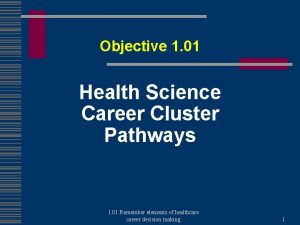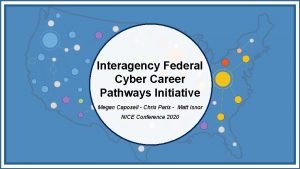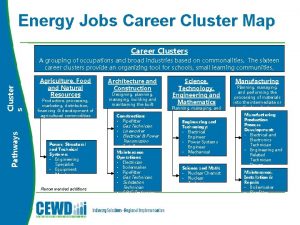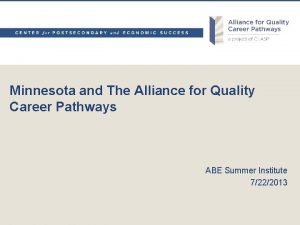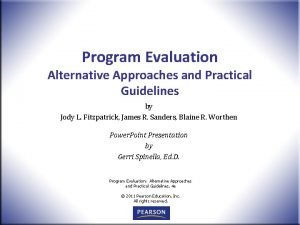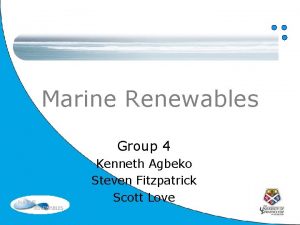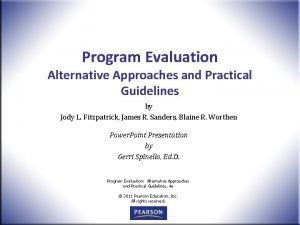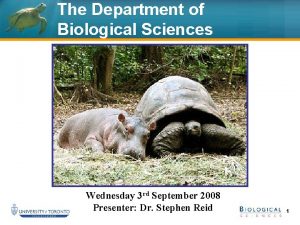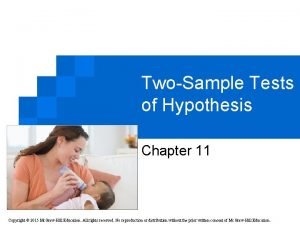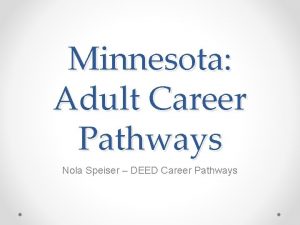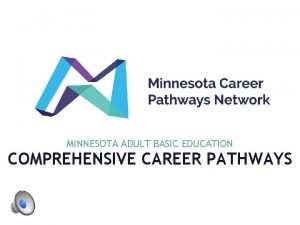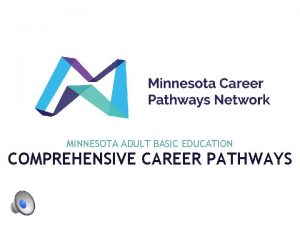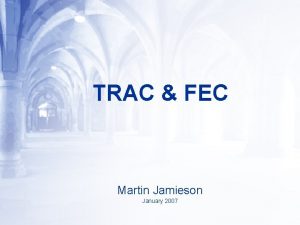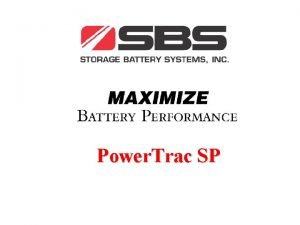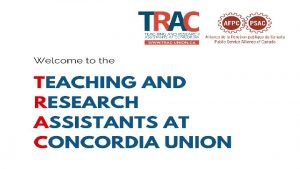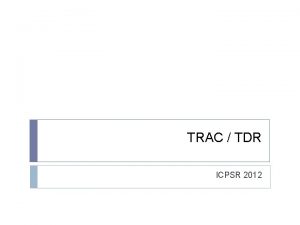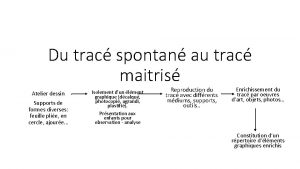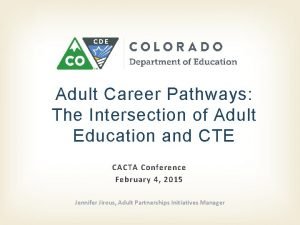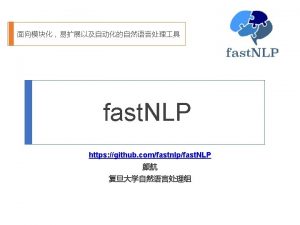Minnesota Fast TRAC Adult Career Pathways Jamie Fitzpatrick















- Slides: 15

Minnesota Fast. TRAC Adult Career Pathways Jamie Fitzpatrick DEED Program Monitor

AGENDA • • • Core Program Activities Participant Eligibility Required Documentation Assessment Individual Employment Plans (IEP) Training Support Services Job Search Assistance Client Contact/Case Notes Program Exits File Review Checklist Financial Reconciliation

CORE PROGRAM ACTIVITIES Fast. TRAC programs contain three required activities: • Contextualized Instruction – Integrates industry/occupation knowledge with basic reading math and language skills • Career Development – Includes work culture, exploration and planning within a career area, job placement and job retention • Support Services Tailored to Adults – Provides each adult with the information and wrap-around assistance needed to reach a goal In addition to these required activities, it is desirable that all Fast. TRAC programs provide a clear link to the next level of Fast. TRAC programming and/or postsecondary education and career pathway employment.

PARTICIPANT ELIGIBILITY Fast. TRAC programs are designed for adults and ABE students ages 16 years old and older, who are not enrolled in secondary school and who qualify under one or more of the following conditions: • Lack of recognized high school credential • Have a limited ability to speak, read or write the English language • Lack sufficient mastery of core basic educational skills (math, reading, writing, listening, speaking below a 12 th grade level) • Lack sufficient mastery of workplace employability skills. Note: Service Providers may apply additional eligibility requirements depending on the specific providers and skill standards of the program

REQUIRED DOCUMENTATION Participants must provide documentation which verifies: • • Date of Birth (A Government Issue Form of Identification) Social Security Number Right-to-Work Status (required for non U. S. citizens) Veterans Status – Form DD-214 (if applicable) Selective Service Registration (required for males born 1/1/1960 or later) Eligibility for Adult Basic Education (ABE) Data Privacy Notification Complaint Procedure All documents are required to be included in the participant file.

ASSESSMENT • • • Structured Interview Basic Skill Interests Personality Values

INDIVIDUAL EMPLOYMENT PLANS (IEP) • • Job Goal Labor Market Information Assessment Results Barriers Training Needs Support Service Needs Action Plan

TRAINING • • • Should Relate to Employment Goal Selecting an Approved Training Provider Coordinating with Financial Aid Resources Obtaining Grades/Progress Reports Credential Documentation Internal Policies/Guidelines

SUPPORT SERVICES • Determined by Individual Need • Documentation Requirements • Not Allowed for Expenses Incurred Before Enrollment • Internal Policies/Guidelines

JOB SEARCH ASSISTANCE • • Keeping Client Engaged in the Program Provide Individualized Job Leads Job Clubs Internal Trainings Mock Interviews Job Logs Career Fairs

CLIENT CONTACT/CASE NOTES • Importance of Maintaining and Documenting 30 Day Contact • Case Notes – Concise yet thorough • Include Relevant Emails • Document Progression toward Education and Job Goals

PROGRAM EXITS • Unsubsidized Employment • PWIR Report • Self-Employment

File Review Checklist Items reviewed include: Required documentation (see previous slide) • Case Notes – Regular Contact – Gaps in Contact – Entered into WF 1 in a timely fashion • WF 1 Activities • Individual Employment Plan – Complete, Incomplete, or Needs Updating • Placement Information – Employer, Job Title, Wage, and Start Date • Data Privacy Notification Complaint Procedure

FINANCIAL RECONCILIATION Monitor will conduct a financial reconciliation with the Grantee’s fiscal staff. Minnesota’s Office of Grants Management (OGM) policy 08 -10 requires one financial reconciliation (can be more than one depending on findings) for a grant award over $50, 000. Financial Reconciliation process includes but is not limited to: • Program Monitor will select the Financial Status Report (FSR) or Invoice for a specified time period in advance of the on-site review • The Grantee will be notified of the selected time period prior to the on-site review • Cost categories on FSR/Invoice will be compared to service provider’s financial transaction report. • Program Monitor may request/obtain supporting documentation for each cost category to trace back to initial invoice. For Grantees that submit FSRs or Cash Advance Payment Requests (CAPR): • The CAPR will be compared to actual expenditures for the reporting period • The FSR will be compared to Reimbursement Payment Request for the reporting period • Differences between expenditures and payments received for the same given period will be identified.

Thank you for your Participation! Jamie Fitzpatrick, DEED Program Monitor 651 -259 -7575 Jamie. Fitzpatrick@state. mn. us
 Career cluster define
Career cluster define Health science career cluster jobs
Health science career cluster jobs Support services career pathway
Support services career pathway Wisconsin career pathways
Wisconsin career pathways Cyber career pathways tool
Cyber career pathways tool Energy career cluster pathways
Energy career cluster pathways Verizon career pathways
Verizon career pathways Quality career pathways
Quality career pathways Fitzpatrick sanders & worthen 2011
Fitzpatrick sanders & worthen 2011 Fitzpatrick maths
Fitzpatrick maths Steven fitzpatrick
Steven fitzpatrick Fitzpatrick sanders & worthen 2011
Fitzpatrick sanders & worthen 2011 Bella fitzpatrick
Bella fitzpatrick Stephen reid utsc
Stephen reid utsc Low level laser therapy cheveux
Low level laser therapy cheveux Mary jo fitzpatrick is the vice president
Mary jo fitzpatrick is the vice president

